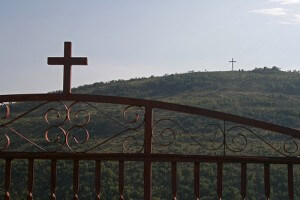Separation of Church and State: Is the Wall Cracking?
May 29th, 2015
The U.S. Constitution does not expressly mandate the “separation of church and state,” much to the surprise of many Americans. In fact, the clauses that reference religion in the Constitution are fairly silent as to any sort of separate religious and secular government functions. What the document does say, is that “no religious test” shall ever be allowed to be required in order to hold public office, and that Congress “shall make no law respecting an establishment of religion, or prohibiting the free exercise thereof.” These last two clauses are known as the ‘establishment clause’ and the ‘free exercise clause.’ Upon reflection on the words of the founding fathers and years of jurisprudence, the supreme law of the United States as to religion has been truncated into an easily summarized statement of separation of church and state. What this phrase means, however, is consistently challenged in American courts and its meaning is arguably evolving in a similar manner as the Constitution itself.
Courts and Separation – What is Legislative Prayer?
The Supreme Court of the United States of America (Supreme Court) has wrangled with the separation issue numerous times in our country’s relatively brief history. Most often, when a case is in front of the Supreme Court, the primary clause at issue is the establishment clause as most conflicts have revolved around a government entity or employee taking some action that references or relates to religion. Typical cases include those involving nativity scenes placed on government property, government funding for religious-based schools, and opening prayers in schools or legislatures. Recently, the Supreme Court has held that these latter types of government actions do not violate the establishment clause as they involve “legislative prayer.” This phrase has come to mean prayer that reflects the religious foundations of the United States, but that does not proselytize or coerce individuals in favor of one religion over another. This viewpoint has not always been the case, however, as previous courts strove to uphold a much stricter view on the separation issue. For example, in Everson v. Board of Education, the court stated that “the wall between church and state…must be kept high and impregnable.”
Modern Shift in Favor of Religion?
Most recently, the Supreme Court has upheld legislative prayer once again in its decision in Town of Greece v. Galloway. In its 5-4 decision, the Court was in unanimous agreement in favor of the idea that a public forum “need not become a religion-free zone,” but then split on just how much of one particular religion could be injected into a legislative prayer. The majority members of the Court stated that these prayers do not need to be stripped of their references to one particular religion in order to meet the constitutionality requirements of the establishment clause. Specifically, the majority indicated in its opinion that references to one religion would only be suspect if they show a pattern over time that would “denigrate, proselytize, or betray an impermissible government purpose.”
The Universal Life Church will continue to analyze current and future court decisions on this topic, and all others that may have an impact on the constitutional rights of individuals as they relate to the freedom of religion.




I deeply thank you for being a watchdog regarding cases which may effect the Church